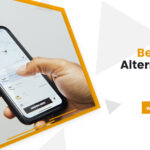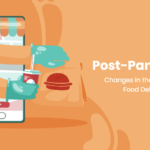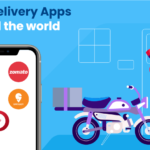Uber-like App Testing
How Safe Is the Cabily – Uber Clone Application?
Here is the list of testing we have done to make sure the application is stable.
Crowd-based Testing
Crowdsourced Testing is important to know the real-world experience of using an application. It improves customer experience and saves your business from serious damages. Our Cabily app has undergone powerful Crowdsourced testing. We improved our app based on the user feedback we gathered from the testing.
Load Testing
Load testing helped us in testing our Taxigen application’s maximum operating potential. After the testing, we have improved the Cabily app. We have prepared it in such a way that it can handle huge traffic volumes without any downtime or lag. Load testing increased reliability and enhanced the performance of the application.
Security/Vulnerability Testing
We have thoroughly tested our Cabily app for any security or vulnerability risks. We also did penetration tests to guess the behavior of attackers and hackers. We did it thorough testing of the source code, bottlenecks. Also, we have carried out attack vectors before we roll out our app. Also, we have tested the web application of our app against various security vulnerabilities.
Volume Testing
In general, the data-volume in the database increases regularly. It slows down the apps and performs at a suboptimal level. Our app script has been subject to rigorous volume testing. We did it to find out how an increased amount of data impacts the system behavior and the response time. As a result of volume testing, the app script is robust and ready for real-world usage.
Stability Testing
We have subjected cabily to stability testing under rigorous but specified conditions. We did it for a predetermined time. It ensures the app’s stability under a variety of conditions and does not break down. Stability testing allowed us to avoid issues like memory leaks and server failures. It also eliminates the unexpected crashing of the app script.
Cross-platform Testing
We have tested the Cabily app for functionality, compatibility, and stability. We have tested it across different platforms, devices, and emulators. This type of testing has allowed us to fix minor bugs. It ensures the app script works smoothly across the different platforms. It helps to check the working without compromising on performance, stability, or security.
User Interface Testing
We have tested it with multi-touch and UI elements (icons, buttons, images, text fields, checkboxes). We have also tested our cabily app screen for various screen resolutions. After that, we have tested it on various themes, and colors to ensure a stable display. The user interface works perfectly fine while being user-friendly.
Configuration Testing
All developed applications have a configuration. All apps need it to work on any device, all major browsers, and all operating systems. We have tested our Uber clone app on a variety of browsers, devices, and major operating systems. It is to test various configurations of settings and compatibility to ensure optimum performance.
Functionality Testing
We have tested all features of the Cabily app under real end-user conditions. It is to ensure there are no functionality-related bugs or failures. We manage all the bugs that we found during the testing phase. We then fix it with appropriate sophistication. We have tested the app on different workflows, multiple configurations & various data sets. It is to ensure it functions optimally under a variety of conditions.
Localization Testing
Our target is to ensure that the Cabily app appeals to the target audience. We have checked and reviewed multiple key points. We did it to optimize it for market-specific parameters. The parameters include the color scheme and phone number formatting. With a well-executed localization strategy, we have paid attention to various factors. It also includes not-so-obvious cultural ins, quirks, and cultural outs. It helps to avoid embarrassing situations.
Manual Testing
Our developers have run multiple test cases manually. It is to test the app without using any scripts or tools. Manual testing is extremely helpful. It will help to uncover software bugs introduced during the development stage. We used manual testing, as a human eye can only find many design-related defects. We do testing through the automation testing approach. So, we cannot exclude the user experience or user interface testing. We require a human eye to carry out such tests.
Installation Testing
We have subjected our Cabily app to implementation testing or installation testing. We do this testing to ensure that our app installs well in a new system. We make sure that it installs along with all the required data and works as expected. This testing reveals bugs and defects. Those bugs can cause the installation process to crash or fail.
Automated Testing
The automation testing performed on our app makes it very effective and efficient. We did this testing using automation testing tools. We used these tools to ran predefined and pre-recorded set of actions and test cases. We used it to compare the results to the successful, verified, and accepted app behavior. Automated testing has made our app robust and highly reliable.
Operational Testing
We subjected our Cabily app to a rigorous operation testing phase. We did it to test the optimum operational readiness of our app script. It helped us to ensure our app’s accessibility, maintainability, and stability. We also checked the recoverability and other important factors through this testing. Operational testing has shown us that our app’s performance. It is to make sure that it is not affected by interruptions like alarms, phone calls, or notifications.
Interrupt Testing
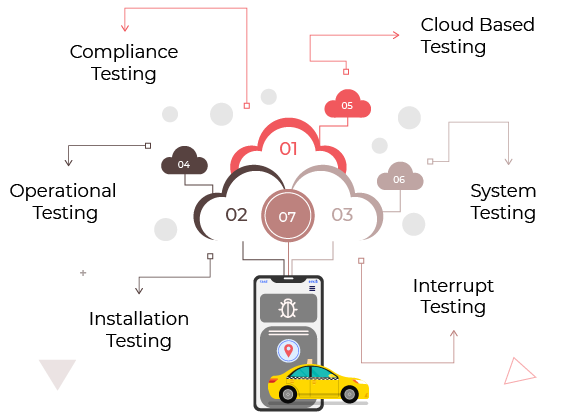
We have rigorously tested it for various kinds of interruptions. It is to allow our users to multitask while using our app. We made sure that the app’s performance and functionality do not get affected if the app gets interrupted. The interruption can be by a phone call, a text message, any other service, or apps installed on the platform. By using a variety of advanced tools, we perform interruption testing. It is to ensure interruption-free operations of our app.
Conformance/Compliance Testing
The apps that are not compliant with the IEEE standards are not safe or secure and have privacy concerns. We have tested our app to comply with various regulations. This type of testing is a regulatory requirement. It involves compliance, load, and volume testing. It is to make an app conform to the regulatory standards.
Stress (Torture) Testing
Given the nature of our app, we have designed to use it by hundreds of users simultaneously. We have subjected our app to strict torture or stress testing. It is to ensure that it performs well under maximum load and extreme conditions. The app is robust and does not break or fail under any kind of condition and, hence, never results in loss of data.
Regression Testing
It is super-easy to add new features or functionality to our app as it is regression-tested. It is to make sure that the app works perfectly fine after adding new features and bug fixes. We also do it after the addition of the new functionality to the existing features. You can easily customize our app script as per your requirements and preferences.
Cloud-based Testing
We simulate the expected real-world user traffic flowing to our app in a cloud. We do it to test how the app behaves and performs its various functions. We test it on a variety of configurations & functionalities in the cloud environment. We also test the app on a variety of simulated devices. Using that, we ensure the app is compatible and stable with all kinds of platforms.
System Testing
We have tested the entire software system of our app by combining testing of each of its components. All the inputs given to the app software system produce outputs. We validate those outputs against the predefined or expected results. This testing is more like black-box testing. Here the app software is a black box that processes inputs and produces the outputs. It is vital to meet the consumer’s technical, functional, and business requirements. The system testing ensures that our Cabily app meets all those requirements.
Smoke Testing
We have performed a careful smoke testing on the app. It is to ensure that the deployed app software build is stable. If the app software requires further testing, then you can find it using smoke testing. QA team uses smoke testing as a vital part of their testing process. Our developers do this testing to ensure that all features of the app work efficiently. They do it to test they work without any roadblocks.
Sanity Testing
We do code updates and perform regression tests on software build regularly. So, some functionalities may cease to work efficiently. So we perform a sanity test on our app script to verify the software functionalities. We do it to test whether it is working similarly after bug fixes and software updates. We sanity-check the quality and security of various software modules of our app. We do it to ensure that the app is crash and attack-proof.
Mobile App Testing Tools We used to Test our App
(I) Testflight
Testflight is one of the best testing platforms. It allows the developers to invite thousands of users and testers to test their apps. Then we gather crucial feedback about the app performance. We do it before we release the app to the masses. We used Testflight to ensure that our app is bug-free, secure, and stable.
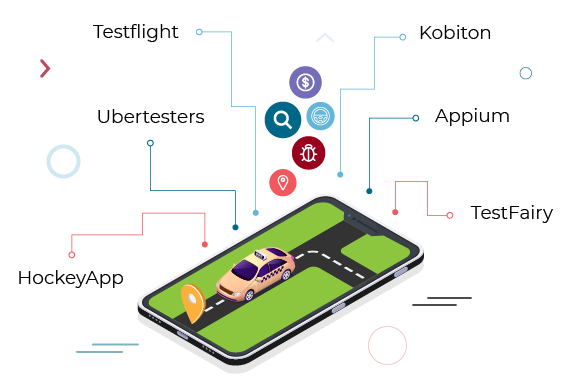
(II) Ubertesters
Ubertesters is one of the best testing and bug reporting tool. It offers a wide range of mobile app testing solutions. Apart from the testing platform, this tool also offers testing services. It is an extremely user-friendly tool. It offers a quick, robust, and accurate app testing process. The output of this testing will result in impeccable and secure apps.
(III) HockeyApp
Organizations or developers use the HockeyApp tool as a virtual vault. They use it to search, hire, and manage various testers, distribute mobile apps, Android, and iOS. They also use it to gather detailed crash/failure reports. This app also helps in gathering user feedback and user metrics. It collects on customer engagement and user behavior.
(IV) Kobiton
Kobiton is one of the most efficient cloud-based mobile testing platform. We use it to execute manual and automated web and mobile tests. We have integrated Selenium WebDriver with Kobiton to test web applications. We use Appium integration with Kobiton to test native and web-based mobile applications. This tool enables teams to collaborate to test mobile applications remotely.
(V) Appium
Appium is an open-source framework. We use it to test our mobile application UI. You can test Hybrid, Native, and web-based applications on Appium. This framework support automation testing on simulators, emulators, and physical devices. As it is offering cross-platform testing, you can use a single Appium API. Using a single API, you can test iOS and Android-based test scripts.
(VI) TestFairy
It is one of the most comprehensive and robust bug reporting and app testing SDK available for mobile apps. It records a video of all phases and steps involved in the app’s testing process. It gathers the required crucial information to reproduce the near-irreproducible bugs. TestFairy does not require any root access and works well on iOS and Android.
Launch your uber clone application in two days on both Android and iOS. Contact us today!

